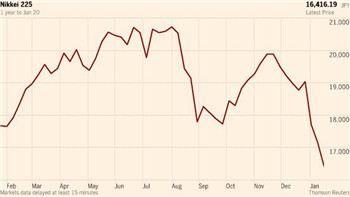(单词翻译:单击)

The global equity rout accelerated on Wednesday, sending the FTSE All-World index into bear market territory for part of the day as oil prices slid to new lows and investors fled for the safety of high-rated government bonds.
周三,全球股市加速下跌,富时环球指数(FTSE All World Index)在交易时段曾一度跌入熊市区间。同时,油价跌至新低,投资者竞相买入安全的、高评级的政府债券。
Fear rippled through global markets, taking the UK, French and Japanese stocks to more than 20 per cent below their 2015 highs — the common definition of a bear market — and compounding equities’ worst start to a year on record.
恐惧情绪蔓延至全球各市场,英国、法国和日本的股指较其2015年高点下跌了20%以上——这是公认的熊市定义——使得今年成为有纪录以来全球股市开局最差的一年。
The US S&P 500, the Dow Jones Industrial Average and the Nasdaq briefly fell more than 3 per cent to more than 10 per cent below their prior peaks, meaning they entered a market “correction”, but rallied in afternoon trading, with the S&P 500 closing down 1.2 per cent.
美国的标普500指数(S&P 500)、道琼斯工业平均指数(Dow Jones Industrial Average)和纳斯达克指数(Nasdaq)一度跌幅大于3%,较前一次高点低10%以上,这意味着美国三大股指进入了市场“回调”。但在午后交易中,三大股指有所上涨,最终标普500指数收跌1.2%。
Equities have been dragged down by rising concerns over China, global economic growth prospects, sliding commodity prices and questions over whether central banks remain willing to act as a backstop.
一直以来拖累全球股市的因素在于,中国经济、全球经济增长前景、大宗商品价格下跌以及央行是否仍愿意充当后盾的问题引起的担忧日益加重。
Investors rushed for safer government debt on Wednesday, crimping the yields of 10-year US Treasuries, UK Gilts, German Bunds and Japanese bonds to just 1.96 per cent, 1.62 per cent, 0.48 per cent and 0.21 per cent respectively. The price of gold also rose sharply.
周三,投资者涌向更安全的政府债券,把10年期美国国债(US Treasuries)、英国国债(UK Gilts)、德国国债(German Bunds)和日本国债的收益率分别压低至仅有1.96%、1.62%、0.48%和0.21%。黄金价格也大幅上涨。
With the German and Chinese indices already in bear territory, the FTSE All-World index, reflecting over $40tn of value from companies listed in developed and emerging markets, fell 3.3 per cent at one point to its lowest level since June 2013. It bounced off its lows for a 2 per cent fall on the day.
由于德国股指和中国股指已然进入熊市区间,反映发达和新兴经济体上市公司40万亿美元市值的富时环球指数曾一度下跌3.3%,为2013年6月以来最低点。随后,该指数从低点向上反弹,当天收跌2%。
Higher-risk emerging markets suffered a “Black Wednesday”, according to Société Générale analyst Bernd Berg, with JPMorgan’s EM currency index sliding to a new record low, and EM stocks diving to their lowest levels since May 2009.
法国兴业银行(Société Générale)策略师贝恩德伯格(Bernd Berg)表示,风险更高的新兴市场惨遭“黑色星期三”,摩根大通新兴市场货币指数(JPMorgan’s EM currency index)跌至创纪录新低,新兴市场股指跌至2009年5月以来最低点。
Natural resource prices suffered another bruising day. The Bloomberg Commodity index fell to its lowest since at least 1991, and crude oil prices fell below $28 a barrel during US trading. Brent bounced off its lows to trade down 2 per cent at $28.19 on Wednesday with WTI off 3 per cent at $28.69.
自然资源价格再次大跌。彭博大宗商品指数(Bloomberg Commodity index)跌至起码1991年以来最低点,美国原油价格跌破每桶28美元。周三,布伦特原油(Brent)较低点有所反弹,收跌2%,收于每桶28.19美元。西德克萨斯中质原油(WTI)收跌3%,收于每桶28.69美元。
Fears over China’s economic slowdown, capital outflows and currency depreciation fuelled the sell-off at the start of January, but those concerns have snowballed into a wider reappraisal of the global economy and the ability and willingness of central banks to support markets.
1月初,中国经济放缓、资本外流和汇率贬值引起的担忧导致了股市抛售,但担忧情绪逐渐加重,促使人们对世界经济状况,以及各国央行支持市场的能力与意愿进行了重新评估。


